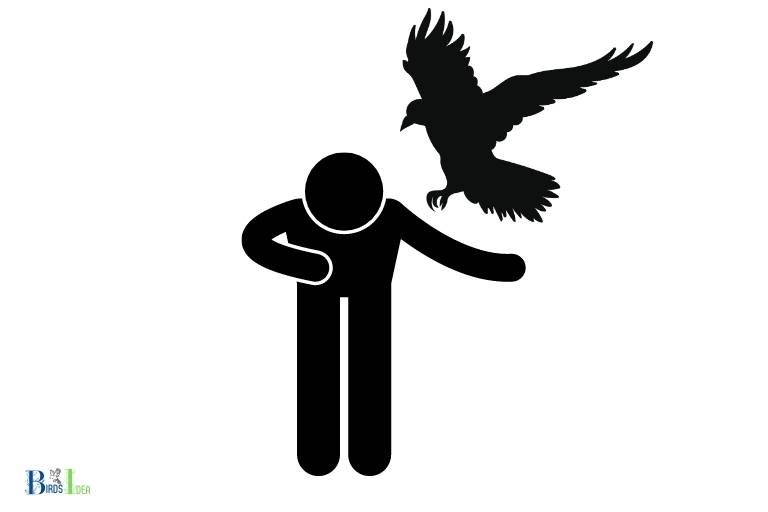What to Do If a Crow Attacks You? Remain Calm!
If a crow attacks you, the best course of action is to remain calm, protect your head and face, and slowly back away from the area.
Crows are intelligent birds and can sometimes become territorial, especially during nesting season.
They may perceive humans as threats, prompting them to attack.
By remaining calm, protecting yourself, and giving the crow space, you can reduce the risk of injury and discourage further aggression.
Crows are known for their remarkable intelligence and memory, so it’s essential to take precautions when encountering them.
If a crow becomes aggressive, try to remain composed and avoid making sudden movements, as this may encourage the crow to attack.
Instead, slowly walk away from the area while protecting your head and face.
If you encounter aggressive crows consistently, contact local authorities or a wildlife organization to report the issue.
8 Steps to Take if a Crow Attacks You
| Step | Action |
| 1 | Remain calm and avoid panicking |
| 2 | Do not provoke or engage the crow |
| 3 | Raise your arms to protect your head |
| 4 | Back away slowly without turning your back to the crow |
| 5 | Find shelter or seek a safe distance |
| 6 | Use an umbrella as a shield if available |
| 7 | Avoid staring directly at the crow |
| 8 | Report the incident to local authorities if necessary |
Key Takeaway

Five Facts About: Crow Attacks
The Nature Of Crows
Crows are part of the corvidae family of birds. They are intelligent, social, and adaptable, making them successful in a variety of environments.
Here are some key characteristics of crows:
Physical Characteristics Of Crows
- Crows are medium-sized birds with wingspans of up to 39 inches and body lengths of up to 21 inches.
- They have black plumage and sturdy, sharp beaks.
- Their eyes are large and set forward, giving them excellent vision and depth perception.
- Crows are highly vocal and have a variety of calls, including caws and rattles.
Behavioral Characteristics Of Crows
- Crows are highly social and often gather in large groups called murders.
- They form lifelong pair bonds and typically mate for life.
- Crows are intelligent, with the ability to problem solve and use tools.
- They are opportunistic feeders, eating a variety of foods including insects, small animals, fruit, and carrion.
- Crows are known for their mobbing behavior, where they band together to drive away predators and perceived threats.
Understanding the unique physical and behavioral characteristics of crows can help individuals avoid conflicts with these fascinating birds. If a crow does attack, it’s important to know how to effectively handle the situation.
Reasons Why Crows Attack
Crows are known to be intelligent birds, often found in large groups. They are territorial and may perceive humans as a threat, which leads to attacks.
Here are the reasons why crows attack:
Defense Of Young
Crows are protective of their young ones and will aggressively defend them if they feel threatened. If you come too close to a crow’s nest, they may attack to protect their offspring.
- If you encounter a crow’s nest, keep your distance and avoid making eye contact.
- If you need to pass through an area with a crow’s nest, wear a hat or carry an umbrella to protect your head.
Territory Protection
Crows are also known to be territorial, especially during mating season. They patrol their territory and will attack any intruders, including humans.
- If you are entering a crow’s territory, move slowly and avoid making any sudden movements that might trigger an attack.
- If you find yourself under attack, the best course of action is to retreat quickly and get away from the area.
Food Resource Protection
Crows are highly competitive foragers, and they will aggressively protect their food sources, including garbage cans, landfills, and bird feeders.
- If you see a crow feeding, stay away from it. If you get too close, the crow may attack to defend its food source.
- To avoid attracting crows to your property, keep all garbage cans securely closed, and do not leave pet food or birdseed out in the open.
Remember, crows are intelligent creatures that, if provoked, can be aggressive and territorial. It’s best to avoid contact with them and be aware of their presence to prevent any attacks. Stay safe and enjoy observing these fascinating birds from a distance.
Identifying Signs Of Aggression
Visual Cues From Crows
Crows are highly intelligent creatures with excellent memories, and they can recognize faces as well. Identifying visual signals of aggression is critical in avoiding conflict with crows.
Here are some visual cues you should look for:
- Wing flapping and tail feathers spreading out wide
- Crouching or bowing with raised feathers
- Direct eye contact
- Head lowering and prolonged staring
- Charging or dive-bombing you
Auditory Cues From Crows
Crows are vocal creatures and use a diverse range of sounds, some of which can be aggressive in tone. By paying attention to these sounds, you can understand the behavior and state of mind of the crows around you.
Here are some auditory cues to look for:
- Loud cawing or screeching
- Repeated cawing and chattering
- Clicking or rattling sounds
- High-pitched calls
- Distress calls
It is essential to be aware of these visual and auditory cues while spending time outside. By understanding these signals, you can stay safe and avoid provoking a crow attack.
Remember, crows can be protective of their territories, looking out for their young ones or sending a warning to other birds in the area.
Stay calm, keep your distance, and let the crows go their way.
Recommended Safety Practices
Keeping A Safe Distance
If you find yourself in an area where crows are present, it’s essential to keep a safe distance.
The following are some recommended safety practices to keep in mind:
- Maintain a distance of at least 50 feet between yourself and the crow.
- If the crow is dive-bombing you, it’s likely protecting its nesting territory. Slowly back away from the area.
- If you see a crow behaving aggressively towards other animals or humans, report it to the local animal control authority.
Wearing Protective Clothing
Wearing the right clothing can help protect you from a crow attack.
Here are some things to keep in mind:
- Wear a hat or head covering, as crows often target the head.
- Use an umbrella or large hat to create a barrier between you and the crow.
- Wear sunglasses or eye protection to prevent eye contact, which crows perceive as a threat.
Avoiding Eye Contact
Crows can perceive eye contact as a threat, which may provoke an attack.
Here are some tips for avoiding eye contact with crows:
- If you encounter a crow, turn your head away and avoid looking directly at it.
- Use sunglasses or eye protection to conceal your eyes.
- Keep calm and don’t show fear, as this can make you appear weak and vulnerable.
Remember, crows are intelligent and social birds, but they can be territorial and defensive when they feel threatened. By following these recommended safety practices, you can stay safe in areas where crows are present.
Steps To Take During An Attack
Staying Calm And Collected
Encountering a crow can be an unnerving experience, especially if it decides to attack you. However, staying calm and collected will be your greatest weapon in defending yourself.
Here are some key points to keep in mind:
- The first thing you should do is to stand still and avoid flailing your arms or running away. This may provoke the crow and make the situation worse.
- Keep your eyes on the bird and try not to make direct eye contact as this may be seen as a challenge.
- Slowly back away from the crow if possible and try to put a barrier between you and the bird.
Protecting Important Body Parts
Crows tend to attack the head and eyes of their prey. Protecting yourself from these attacks is crucial to avoiding serious injury.
Here are some ways to protect your body:
- If you have a hat or jacket, use it to cover your head and face.
- Use your hands to shield your face and eyes, making sure to keep your fingers curled and your palms facing outward.
- Do not turn your back on the crow, as it may attack your head or neck.
Distracting The Crow
If you find yourself in a situation where a crow is attacking you, it may be helpful to distract the bird in order to create an opportunity to get away.
Here are some ways to do that:
- Crows are highly intelligent birds and can be distracted by shiny or reflective objects. Try throwing a shiny object or a piece of jewelry away from you to capture the crow’s attention.
- Use an umbrella to create a barrier between you and the bird. Open and close it repeatedly to scare the bird away.
- If you have a water bottle, try squirting water towards the crow to deter it from attacking you further.
Remember, prevention is always better than cure. Be mindful of your surroundings, avoid crow habitats if possible, and avoid bringing food to areas where crows may be present. Stay calm, protect your vital body parts, and try to distract the crow if it is attacking you.
By following these steps, you can avoid a potentially dangerous situation and stay safe.
Dealing With Injuries
If you ever encountered a crow attack, you must remain calm and take the necessary precautions to avoid any severe injuries. In some cases, however, you may need medical attention to treat your wounds.
Seeking Immediate Medical Attention
Crow bites can cause significant pain, bleeding, and inflammation. If you experience any of these symptoms after a crow attack, you must seek immediate medical attention.
The following are some of the signs that you should visit an emergency room:
- Uncontrolled bleeding
- Difficulty breathing
- Swelling or pain in the neck or head
- Loss of consciousness
Make sure to inform the healthcare professional about the crow attack and provide all relevant details for proper treatment.
Discussing Treatment Options With Healthcare Professionals
After seeking medical attention, you may need further treatment, such as antibiotics or stitches. In this case, it is essential to discuss the different options with the healthcare professional.
Some of the points to keep in mind include:
- The severity and location of the injury
- Your medical history and allergies
- Your ability to take medications or undergo certain treatments
It is crucial to follow the healthcare professional’s advice to ensure proper healing and avoid any complications.
Overall, if you experience a crow attack, you must seek medical attention if necessary and discuss all the treatment options with a healthcare professional. Remember to provide all relevant details about the attack to ensure proper diagnosis and treatment.
Prevention Methods
Crows are pretty intelligent and fascinating creatures; however, bird enthusiasts know that they can pose problems for humans, particularly when nesting season approaches. Luckily, there are several strategies that you can follow to prevent crow attacks.
Below, we detail the most effective ways that can help you avoid getting attacked and protect you while you walk around your local area.
Keeping A Low Profile
The first step to avoid crow attacks is to keep a low profile. It’s advisable to limit the amount of time you spend outside during nesting season, as crows can be territorial during this time.
If that’s not possible, here are some tips that you can follow:
- Wear a hat or carry an umbrella when outside.
- Use your peripheral vision to keep tabs on crows that may be nearby.
- Walk calmly and avoid making sudden movements.
- Keep your head down and walk away from the area.
Removing Attractive Food Sources
Crows are attracted to sources of food, making it crucial to remove these sources from the vicinity.
Here are some ways you can do this:
- Dispose of trash properly. Use bins instead of littering.
- Cut down on pet food, fruit, and seed spillage.
- Clear birdfeeders regularly, particularly if they attract other birds.
- Keep compost piles securely covered.
Altering Human Behavior
Crows typically remember faces, making them wary of people they see regularly. Altering your behavior can help keep crows at bay.
Here are some things you can do:
- Use alternate routes so that you aren’t seen by crows regularly.
- Avoid wearing shiny jewelry or carrying mirrors as they can provoke crows with reflections.
- Do not make eye contact with crows as it can trigger territorial behavior.
- If you encounter crows, walk away and do not try to feed or interact with them.
By following these best practices, you can successfully prevent crow attacks and keep yourself safe. Remember always to maintain respectful behavior and avoid provoking these creatures unnecessarily.
Stay alert, and be sure to use common sense when walking around crows’ territory during nesting season.
FAQ On What To Do If A Crow Attacks You
How Do You Prevent Crows From Attacking You?
Do Crows Attack Humans For No Reason?
What Should You Do If A Crow Attacks You?
Can Crows Cause Any Serious Harm To Humans?
How Do Crows React To Humans In Their Territory?
Conclusion
If you ever encounter a crow that seems to show signs of aggression, it is important to remember that these creatures are highly intelligent and can act out of self-defense. The best approach is to remain calm and avoid provoking the bird further.
Try to protect your eyes and head while slowly backing away from the area. Additionally, keep in mind that crows are social creatures and may be trying to defend their territory or young.
Avoid areas with known crow nests or populations, and try to make yourself less of a perceived threat by offering them food or leaving the area peacefully.
By following these tips, you can better handle a crow encounter and avoid potential injury. Remember to respect these unique and intelligent birds for their remarkable intelligence and community-oriented behavior.






